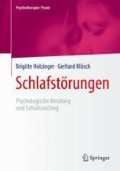Zusammenfassung
Stress ist eine der häufigsten Ursachen für nicht erholsamen Schlaf. Bedingt durch die ständige Erreichbarkeit mittels moderner Kommunikationstechniken, wird es immer schwieriger, sich von der Arbeitswelt und den Verpflichtungen der Freizeitaktivitäten abzugrenzen. Auch wenn die Person es schaffen sollte, allen Terminen nachzukommen, die ihr auferlegt wurden oder die sie sich selbst auferlegt hat, so wird sie abends, wenn es Zeit ist, zu Bett zu gehen, noch immer „unter Strom“ stehen. Die direkten Folgen sind oftmals zunächst Einschlaf- oder Durchschlafschwierigkeiten, belastende Träume bis hin zu Albträumen, Magen-Darm-Beschwerden oder Herz-Kreislauf-Störungen. Ein geregelter Tagesablauf und die Einhaltung von Schlafhygieneregeln können dem beginnenden Kreislauf von gestörtem Schlaf und dadurch noch mehr Stress entgegenwirken.
Literatur
Allmer, H. (1996). Erholung und Gesundheit. Grundlagen, Ergebnisse und Maßnahmen. Göttingen: Hogrefe.
Bertisch, S. M., Wells, R. E., Smith, M. T., & McCarthy, E. P. (2012). Use of relaxation techniques and complementary and alternative medicine by American adults with insomnia symptoms: Results from national survey. Journal of Clinical Sleep Medicine, 8(6), 681–691.
Bowden, A., Lorenc, A., & Robinson, N. (2012). Autogenic training as a behavioural approach to insomnia: A prospective cohort study. Primary Health Care Research & Development, 13(2), 175–185.
Chien, H. C., Chung, Y. C., Yeh, M. L., & Lee, J. F. (2015). Breathing exercise combined with cognitive behavioural intervention improves sleep quality and heart rate variability in major depression. Journal of Clinical Nursing, 24, 21–22.
Dentico, D., Ferrarelli, F., Riedner, B. A., Smith, R., Zennig, C., Lutz, A., Tononi, G., & Davidson, R. (2016). Short meditation trainings enhance non-REM sleep low-frequency oscillation. PLoS One, 11(2), https://doi.org/10.1371/journal.pone.0148961.
Hassett, A. L., Radvanski, D. C., Vaschillo, E. G., Vaschillo, B., Sigal, L. H., Katsamanis Karavidas, M., Buyske, S., & Lehrer, P. M. (2007). A pilot study of the efficacy of heart rate variability (HRV) biofeedback in patients with fibromyalgia. Applied Psychophysiology and Biofeedback, 32, 1–10.
Hauri, P. J., Percy, L., Hellekson, C., Hartmann, E., & Russ, D. (1982). The treatment of psychophysiologic insomnia with biofeedback: A replication study. Biofeedback and Self-Regulation, 7(2), 223–235.
Hoedlmoser, K., Pecherstorfer, T., Gruber, G., Anderer, P., Doppelmayr, M., Klimesch, W., & Schabus, M. (2008). Instrumental conditioning of human sensorimotor rhythm (12–15 Hz) and its impact on sleep as well as declarative learning. Sleep, 31(10), 1401–1408.
Ilovar, S., Zogler, D., Castrillon, E., Car, J., & Huckvale, K. (2014). Biofeedback for treatment of awake and sleep bruxism in adults: Systematic review protocol. Systematic Reviews, 3, 42, https://doi.org/10.1186/2046-4053-3-42.
Sakakibara, M., & Hayano, J. (2013). Heart rate variability biofeedback improves cardiorespiratory resting function during sleep. Applied Psychophysiology and Biofeedback, 38, 265–271.
Schabus, M., Heib, D. P., Lechinger, J., Griessenberger, H., Klimesch, W., Pawlizki, A., Kunz, A. B., Sterman, B. M., & Hoedlmoser, K. (2014). Enhancing sleep quality and memory in insomnia using instrumental sensorimotor rhythm conditioning. Biological Psychology, 95, 126–134, https://doi.org/10.1016/j.biopsycho.2013.02.020.
Schultz, J. H. (2003). Das autogene Training: Konzentrative Selbstentspannung; Versuch einer klinisch-praktischen Darstellung. Stuttgart: Georg Thieme.
Sterman, M. B., Howe, R. C., & Macdonald, L. R. (1970). Facilitation of spindle-burst sleep by conditioning of electroencephalographic activity while awake. Science, 167(3921), 1146–1148.
Stetter, F., & Kupper, S. (1998). Autogenes Training – Qualitative Meta-Analyse kontrollierter klinischer Studien und Beziehungen zur Naturheilkunde. Forschende Komplementärmedizin, 5(5), 211–223.
Van der Zwan, J. E., de Vente, W., Huizink, A. C., Bögels, S. M., & Bruin, E. I. (2015). Physical activity, mindfulness meditation, or heart rate variability feedback for stress reduction: A randomised controlled trial. Applied Psychophysiology and Biofeedback, 40, 257–268.
Ziv, N., Rotem, T., & Amon, Z. (2008). The effect of music relaxation versus progressive muscular relaxation on insomnia in older people and their relationship to personality traits. Journal of Music Therapy, 45(3), 360–380.
Author information
Authors and Affiliations
Rights and permissions
Copyright information
© 2018 Springer-Verlag GmbH Deutschland
About this chapter
Cite this chapter
Holzinger, B., Klösch, G. (2018). Entspannungstechniken und deren Anwendbarkeit bei Schlafstörungen. In: Schlafstörungen. Psychotherapie: Praxis. Springer, Berlin, Heidelberg. https://doi.org/10.1007/978-3-662-54668-0_23
Download citation
DOI: https://doi.org/10.1007/978-3-662-54668-0_23
Published:
Publisher Name: Springer, Berlin, Heidelberg
Print ISBN: 978-3-662-54667-3
Online ISBN: 978-3-662-54668-0
eBook Packages: Medicine (German Language)

